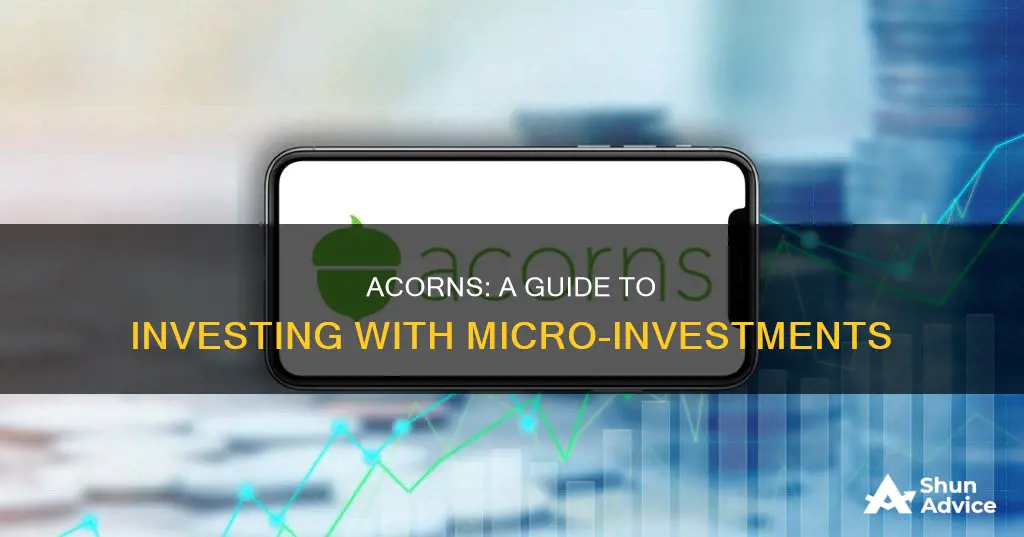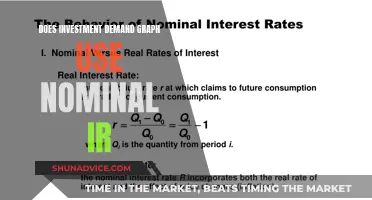
Acorns is a micro-investing app that is designed to help beginners get their feet wet in the stock market. It offers a robo-advisor platform, tax-advantaged IRAs for retirement, and a checking account. Its main feature is that it allows users to invest the spare change from their everyday purchases. For example, when you purchase a coffee for $3.75, Acorns rounds up to the nearest dollar and invests the spare $0.25 into the market. The idea is that over time, these small contributions will add up.
Acorns offers three membership tiers: Personal ($3 per month), Personal Plus ($5 per month), and Premium ($9 per month). The app is available to download for free on the App Store and Google Play.
While Acorns is a great way for beginners to get started with investing, there are some drawbacks. The monthly fee can be steep if you're not investing much, and investment options are limited. Additionally, Acorns does not offer tax-loss harvesting or any type of tax assistance.
| Characteristics | Values |
|---|---|
| Account opening fee | $0 |
| Minimum investment amount | $5 |
| Investment options | Exchange-traded funds (ETFs) |
| Investment diversification | Over 7,000 stocks and bonds |
| Investment selection | Based on user's risk tolerance, goals, age, income, and time horizon |
| Investment management | Fully automated |
| Tax-loss harvesting | No |
| Account fees | $3, $6, or $12 per month |
| Investment expense ratios | 0.04% to 0.22% |
| Withdrawal fee | $0 |
| Transfer-out fee | $35 per ETF |
| Account closure | Cancel subscription in settings, funds returned in 3-6 business days |
| Customer support | 7 days a week, 5:00 a.m. to 7:00 p.m. PT |
| Educational content | Yes |
What You'll Learn

How to use the Acorns app
The Acorns app is designed for novice investors who want to start investing in the stock market. It is a robo-advisor that offers a taxable brokerage account, a tax-advantaged retirement account, and a checking account. Its main feature is micro-investing, allowing you to invest the spare change from your everyday purchases.
Here's how to get started with the Acorns app:
- Sign up for an Acorns account through their website or mobile app. You'll need to provide personal information such as your email address, physical address, and Social Security number. You'll also need your online banking information to fund the account and pay the monthly subscription fee.
- Answer a few questions to determine your risk tolerance and financial goals. You'll be asked about your age, net worth, income, and investment timeline.
- Link a spending account. You can link a credit or debit card so that the spare change from your purchases can be invested. The round-ups will be transferred to your investment account once the amount reaches $5.
- Set up recurring contributions. You can contribute as little as $5 at a time, and this is a great way to take advantage of dollar-cost averaging to build your portfolio over time.
- Explore the app's features. Acorns offers a variety of tools to help you save and invest, including Round-Ups, Earn rewards, and retirement accounts.
- Monitor your investments. The Acorns app provides an easy way to track your portfolio's performance and make adjustments as needed.
Keep in mind that Acorns charges a monthly fee of $3, $6, or $12, depending on the plan you choose. This fee may be steep for small balances, so it's important to consider your investment amount and goals before signing up.
Understanding Quicken: Cash and Investments Reconciliation Issues
You may want to see also

The benefits of investing with Acorns
Acorns is a micro-investing app that is ideal for beginners who want to start investing but don't have much money to put in. The app is very user-friendly and offers a low-effort way to save money. Here are some of the benefits of investing with Acorns:
- No minimum requirement to open an account: You can open an account with $0 and start investing with as little as $5. This makes Acorns very accessible to new investors who may not have a large sum of money to invest.
- Automatic and hassle-free: Acorns' Round-Ups feature allows you to invest your spare change from everyday purchases. You can link your credit or debit card to the app, and it will automatically round up your transactions to the nearest dollar and invest the difference. This means you can build your investment portfolio without any effort or second thought.
- Customisable: You can customise how quickly your round-ups accumulate. You can apply them only to specific purchases or turn them off completely. You can even retroactively claim round-ups from purchases made before signing up.
- Diversified portfolios: Acorns invests your money into a specific type of fund. Your investment is distributed over Exchange-Traded Funds (ETFs) through their partner Vanguard. This means your investment is diversified across over 7,000 stocks, ensuring a robust and well-balanced portfolio.
- Educational resources: Acorns provides access to educational articles, videos, and blogs to help you learn about investing. This makes it a great platform for those who want to learn more about investing while building their portfolio.
- Hands-off: Acorns is a robo-advisor platform, which means it takes the complexity out of investing. It offers a completely hands-off and automated investment service. You simply answer questions about your risk tolerance and investment goals, and Acorns takes care of the rest.
- Additional features: Acorns offers a range of additional features such as Acorns Later, which allows you to set up an IRA with your spare change, and Acorns Early, which provides investment accounts for children. They also offer a checking account with a debit card and access to fee-free ATMs.
While Acorns is a great platform for beginners, it's important to note that the monthly fees can be steep if you're not investing much. To get the most out of Acorns, it's recommended to set up larger recurring deposits in addition to the spare change round-ups.
Recording Cash Investments: A Quickbooks Guide
You may want to see also

The drawbacks of investing with Acorns
While Acorns is a great platform for beginners, there are some drawbacks to investing with the app. Here are some of the disadvantages of using Acorns for your investments:
High fees for small balances
Acorns charges a flat monthly fee of $3, $6 or $12, depending on the plan chosen. While this may seem reasonable, it can be a significant percentage of assets for investors with small balances. For example, if you only contribute through the round-up feature, the monthly fee will make up a large proportion of your account balance.
Limited investment options
Acorns offers a limited range of investment options compared to other apps. It provides access to ETFs and a Bitcoin-linked ETF, but does not allow direct investment in Bitcoin or other cryptocurrencies. If you are seeking a broader range of investments or more advanced tools and features, other platforms may be more suitable.
No tax-loss harvesting
Acorns does not offer tax-loss harvesting, which is an investment strategy that can reduce capital gains tax liabilities. This is a feature provided by some of its competitors, such as Vanguard Digital Advisor, Wealthfront and Betterment.
No access to financial advisors
Unlike some other robo-advisors, Acorns does not provide access to human financial advisors, which may be a drawback for those seeking personalised advice.
Fee to access checking account
While Acorns offers a checking account with some attractive features, you need to pay a monthly fee to access it. This is unlike some other robo-advisors, such as Betterment, which provide access to a checking account without additional charges.
Limited trading features
Acorns is designed for beginners and passive investors, so it does not offer the same level of trading features as some other platforms. If you are seeking greater flexibility and advanced trading tools, you may need to look elsewhere.
Champagne's Investment Flows: 2008 Insights and Analysis
You may want to see also

How much it costs to invest with Acorns
Acorns is a robo-advisor service that offers a simple, low-cost passive investing solution. It features an automatic savings tool that rounds up purchases made with linked accounts to the nearest dollar and sweeps the change into an investment portfolio.
Acorns offers three membership plans, all of which charge flat monthly fees:
- Bronze Tier: $3/month ($36/year)
- Silver Tier: $6/month ($72/year)
- Gold Tier: $12/month ($144/year)
The fees include access to different features, such as taxable brokerage and retirement accounts, cash-back rewards, and high-yield checking and savings accounts.
The management fee on small accounts can be relatively high compared to competitors, who typically charge a percentage of assets under management per year. For example, to achieve an equivalent fee of 0.25% at each level, you would need account balances of $14,400, $28,800, and $57,600, respectively.
Additionally, there is an expense ratio, which is an annual fee charged by the funds you invest in. These fees range from 0.03% to 0.25% and are paid in addition to the account management fee.
If you decide to transfer your investments out of Acorns to another provider, there is a steep fee of $35 per ETF.
Overall, while Acorns offers a simple and automated way to invest, the costs can be significant, especially for those with small account balances.
Cashing Out Investments: Using the Cash App to Withdraw Funds
You may want to see also

How Acorns compares to other investment platforms
Acorns is a micro-investing app that offers a simple, low-cost, and passive investing solution. It is designed for beginners and passive investors who want to invest small amounts of money without complex charting tools and dashboards. Its mobile-first approach to building a diversified portfolio of low-cost ETFs is geared towards those interested in opening their first brokerage account, custodial account, or IRA.
Acorns' fees are on the high side, especially for those with low balances. The app offers three plans, charging a flat monthly fee of $3, $6, or $12, which can be a high percentage of assets for investors with small balances. For example, a $100 account would incur fees of around 12% annually, while a $1,000 account would face a 1.2% fee.
Acorns' investment options, personalization, and strategies are limited compared to other apps. It does not offer tax-loss harvesting or access to human advisors, and there are no advanced charting features.
Acorns stands out for its unique micro-investing feature, Round-Up, which invests your spare change from every purchase made with a linked credit or debit card. It also offers cash-back rewards at over 450 retailers and a high-yield checking account.
For beginner investors with small balances seeking a simple, automated, and low-cost investing solution, Acorns is a good option. However, those seeking greater flexibility, advanced features, and lower fees may want to consider alternative investment platforms such as SoFi, Betterment, or Schwab Intelligent Portfolios.
Cash vs Investing: Is Holding Cash Ever Better?
You may want to see also
Frequently asked questions
Acorns is a micro-investing app that offers an approachable platform for beginners. It is a robo-advisor that invests your spare change and any other contributions you make into a selection of about 25 low-cost, diversified ETFs (which include more than 7,000 stocks and bonds).
Acorns automatically invests your spare change with their Round-Ups feature. Whenever you make a purchase with your linked card, Acorns rounds up the transaction to the next dollar. That change is put in a diversified portfolio based on your age, time until retirement, financial goals, and risk tolerance.
Acorns has three plans:
- Bronze Tier: $3/month
- Silver Tier: $6/month
- Gold Tier: $12/month
Acorns is perfect for new investors or those who don't have the time to figure out the stock market. It's a great way for young adults with no 401(k) or retirement account to save and invest money passively.
The fees are high for small balances. $3 a month or $36 per year doesn't sound like a lot, but the percentage can be steep for small balances. If you only have $10 in your account, that's a 30% monthly fee.







